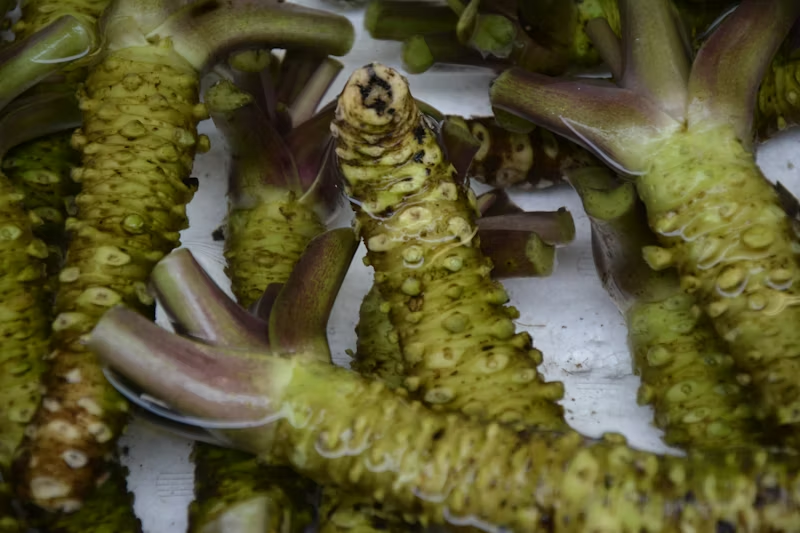Wasabi: Spicy Superfood Health Benefits
Authentic wasabi contains compounds that may provide antibacterial, anti-inflammatory, and even anticancer effects. These properties stem from isothiocyanates, bioactive compounds found in cruciferous vegetables. Unfortunately, much of the "wasabi" served in restaurants outside Japan is actually a mixture of horseradish, mustard, and food coloring, lacking the full spectrum of beneficial compounds found in the real plant.

Wasabi, a pungent green paste commonly served alongside sushi, offers more than just a fiery kick to Japanese cuisine. This unique condiment comes from the grated rhizome of the Wasabia japonica plant, also known as Japanese horseradish. While many are familiar with its intense flavor, few realize the potential health benefits hidden within this spicy ingredient.
Authentic wasabi contains compounds that may provide antibacterial, anti-inflammatory, and even anticancer effects. These properties stem from isothiocyanates, bioactive compounds found in cruciferous vegetables. Unfortunately, much of the "wasabi" served in restaurants outside Japan is actually a mixture of horseradish, mustard, and food coloring, lacking the full spectrum of beneficial compounds found in the real plant.
The wasabi plant thrives in cool, shaded areas with clean running water, making it challenging to cultivate on a large scale. This scarcity contributes to its high price and relative rarity in many parts of the world. Those seeking the true benefits of wasabi should look for authentic products made from the genuine Wasabia japonica root, rather than imitation versions.
Nutritional Profile and Health Benefits
Wasabi offers a rich array of nutrients and bioactive compounds that contribute to various health benefits. Its unique composition provides potential advantages for multiple bodily systems and specific health conditions.
Vitamins and Minerals Content
Wasabi contains a diverse range of essential vitamins and minerals. It is a good source of potassium, with 100 grams providing approximately 568 mg. This mineral plays a crucial role in regulating blood pressure and heart rate.
Wasabi also contains significant amounts of calcium, offering about 128 mg per 100 grams. This mineral is vital for bone health and muscle function.
Other minerals present in wasabi include:
- Manganese
- Iron
- Copper
- Magnesium
These elements act as cofactors for various enzymatic processes in the body, supporting overall health and well-being.
Bioactive Compounds and Their Effects
Wasabi's health benefits largely stem from its bioactive compounds, particularly isothiocyanates. These sulfur-containing molecules are responsible for wasabi's pungent flavor and many of its medicinal properties.
The primary isothiocyanate in wasabi is allyl isothiocyanate. This compound exhibits:
- Antimicrobial properties
- Anti-inflammatory effects
- Potential anti-cancer activities
Isothiocyanate vapors from wasabi help deter the growth of yeast, mold, and bacteria, making it a natural preservative often used with raw fish in sushi and sashimi.
Wasabi also contains antioxidants that combat oxidative stress and may help protect cells from damage.
Health Benefits Related to Specific Conditions
Wasabi's unique nutritional profile contributes to several potential health benefits. Its anti-inflammatory properties may help alleviate joint and muscle discomfort, potentially benefiting those with arthritis or other inflammatory conditions.
The isothiocyanates in wasabi have shown promise in cancer prevention studies, though more research is needed to confirm these effects in humans.
Wasabi's antibacterial properties may help prevent food poisoning when consumed with raw fish. This protective effect extends to oral health, as wasabi may help prevent tooth decay by inhibiting bacterial growth in the mouth.
The potassium content in wasabi supports cardiovascular health by helping to regulate blood pressure. Additionally, its fiber content, though modest, contributes to gut health and may aid in maintaining a healthy digestive system.
Culinary Uses and Considerations
Wasabi plays a central role in Japanese cuisine, adding a unique flavor profile and heat to various dishes. Proper preparation and consumption techniques are essential to fully appreciate its culinary potential.
Wasabi in Japanese Gastronomy
Wasabi is an integral part of Japanese cuisine, particularly in sushi and sashimi preparations. Its pungent flavor complements raw fish, enhancing the overall taste experience. Chefs often use wasabi as a condiment, forming it into a small mound next to sushi or mixing it with soy sauce for dipping.
In addition to sushi, wasabi appears in other Japanese dishes. It can be incorporated into dressings, sauces, and marinades to add a spicy kick. Some innovative chefs even use wasabi in desserts, creating unique flavor combinations.
Preparation and Consumption Guidelines
Preparing authentic wasabi requires grating the fresh rhizome against a sharkskin grater just before serving. This process releases the volatile compounds responsible for wasabi's distinctive flavor and aroma. The grated paste should be consumed within 15-20 minutes for optimal taste.
For those unable to access fresh wasabi, wasabi paste or powder are common substitutes. These products often contain horseradish, food coloring, and other additives to mimic the flavor and appearance of real wasabi. When using wasabi powder, mix it with water to form a paste.
Consumption guidelines:
- Start with a small amount to gauge heat tolerance
- Mix wasabi thoroughly with soy sauce if desired
- Avoid excessive consumption, as it may cause nasal irritation or nausea
Want more posts like this?Sign up for our FREE newsletter →